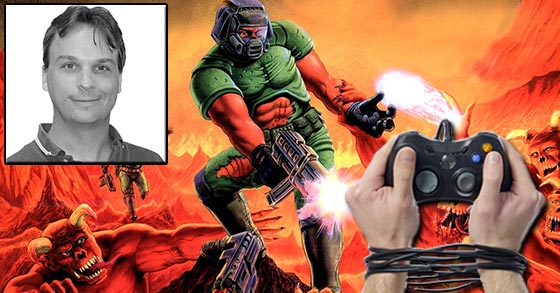Chris Ferguson (psychology professor) interview – Video game violence, addiction and “Gaming disorder”

Just recently I (Robin Ek, TGG) I got the chance to do an interview with Chris Ferguson (psychology professor at the Stetson University in Florida, US). So I talked to Ferguson about everything from the said connection between video game violence and real-life violence (politicians and the media love to use that connection A LOT), video game addiction to WHO’s “Gaming disorder” and video game health hysteria. So without any further ado, please enjoy the interview =)
Robin TGG
Would you be so kind and introduce yourself to our readers?
Ferguson
Sure thing, my name is Chris Ferguson and I’m a professor of psychology at Stetson University in Florida. I have a Ph.D. in clinical psychology, am licensed as a psychologist and have done a fair bit of research on media effects.
Robin TGG
Way back in 2015, Academic Minute published a post called “Chris Ferguson, Stetson University – Influence of Violent Video Games”. So my question to you would be the following, what have you learned since then about the matter of the “influence” of violent video games? And what’s your take on today’s violent video games Vs everything that they’ve been blamed for? (violent crimes, terrorism and so on).
Source:
Academic minute
Ferguson
I don’t think a lot has changed since 2015, in the sense that the slow steady erosion of the “media effects” hypothesis continues. Probably one of the biggest movements has been several studies now suggesting (via fMRI or other means) that desensitization does not occur due to violent game play. I think the “pretty pictures” used by fMRI and such have been one thing commonly used to try to convince audiences of games’ effect on the brain, so it’s interesting to see this area crumble.
But more critically, I think this slow movement toward more skepticism is simply a generational one. Although there’s data on both “sides” I don’t think the debate was every really about data, and more about moral agendas, typical generational divides and politics. As the “audience” for game fearmongering dies off, the narrative will inevitably change.
Robin TGG
What could you tell me about your and Patrick Markey’s book “Moral Combat: Why the War on Violent Video Games Is Wrong”? And how did the book came about to happen?
Source:
Amazon
Ferguson
To give credit where it is due, the book is really Patrick’s. He was just kind enough to invite me along for the ride! But of course, we’ve both been in this field for over 10 years and have quite an insider view. We thought it would be interesting for the general public to have a bit more of an insider view of the field and the politics as well as the data…and naturally have a bit of fun writing it.
Robin TGG
I don’t know if you have read our interview with Running with scissors (I’ll get to the point shortly), but their game “Postal” more or less saved my life. I’m bringing that up since the main-stream media, anti-Gamer sites and quite a few politicians are blaming a lot of bad things on violent games. However, in my case, Postal actually helped me to coop with deep depression. I would also like to add that games such as “Brutal Doom” and “Project Brutality” have helped me wind down from all the stress that surrounds me.
So I’m just wondering if you (or anyone else in your field of work) have ever made a research on the positive aspects of playing violent video games?
Source:
Running with scissors interview
Ferguson
Well Postal also won fame for implicitly being at the center of the Brown v EMA (2011) Supreme Court case as advocates for regulation kept referring to its more salacious qualities. But yes, I’d say the phenomenon you describe is pretty well established. For a lot of gamers, playing action games reduces stress. It’s not that there’s anything magical about games, more that they work like any hobby in this respect. And like any activity it only works to reduce stress if it’s something you enjoy (as we note in the book many people’s hobbies like knitting would probably stress us out!).
I think that’s an important point for theory in media effects moving forward. We’ve really gotten wrapped up in a “one side fits all” approach to media theory…that everyone is influenced in the same direction, some maybe more, some maybe less. That makes it easy for people to think “I don’t like that media and it makes me feel bad. Therefore it’s universally bad and harmful.” But that doesn’t seem to be how media effects work…it’s more about the match or fit between a consumer and the media they consume…that’s far more important than content itself.
Robin TGG
You know, all this blaming and finger-pointing at violent video games made me think about the 90s. Because I still remember when SEGA and Nintendo were taken to court over the violent content that was to be found in Mortal Kombat.That’s also why I’m rather curious to know what exactly has been proven when it comes to violent acts and crimes that have been connected to playing violent games. So, perhaps you could shed some light on the matter?
Source:
Mortal Kombat 1 fox news controversy (Sept. 13, 1993)
The psychologist
Video games dont make kids violent
Shooting video games blamed again
Video games societal violence statement
Ferguson
Well there was never much data connecting violent games to crime, the contrary if anything. But people conflated the mild aggression acts we have people do in the lab (giving others hot sauce, bursts of white noise or putting their hand in cold water) with criminal acts. Unfortunately, this was often encouraged by some scholars and, I’d argue, some professional organizations such as the American Academy of Pediatrics. But evidence is pretty clear that media violence does not play a role in causing crime, and there’s some evidence that the release of popular action movies and games is associated with immediate declines in crime. This probably happens by occupying young males and giving them something to do rather than be mischievous.
Robin TGG
On the 20th of April, in 1999 the Columbine massacre shocked America (and the rest of the world), and in the aftermath of that terrifying event, the media and politicians went out on a crusade to find a scapegoat to blame everything on. Well, the scapegoat of choice would be violent video games (mainly ID’s Doom) and the shock rocker Marilyn Manson. I’m bringing this up since there have been (sadly enough) plenty of similar cases as of lately) such as the Munich attack and the Orlando mass shooting).
What I’m trying to get at is that the people who decide to do horrible acts (whatever it may be) have already set their minds to do it. So I just feel it’s very easy to pin down all the world’s problems on violent video games, when the reality is much deeper and difficult to understand.
I mean, a lot of killers don’t even need a reason to kill people, they just do it. I’m no expert on that particular field, but I have watched a lot of documentaries about mass murderers and serial killers in the past, and most of them have been brought up in broken homes (as in been abused at home, having drug abusing and criminal and criminal etc.). So even if violent video games wasn’t around, we still would have to deal with violent crimes and whatnot. As the hard reality will always be around.
Source:
Germanys minister of interior blames violent video games for the munich attack
Jonathan Blow and a handful of journalists blames the orlando mass shooting on violent video-games
Interview with Marilyn Manson – Bowling for Columbine
Marilyn Manson And Henry Rollins Discuss The Columbine Murders
The famous Marilyn Manson’s bowling for Columbine quote
Ferguson
Most criminologists who study mass violence largely discount the notion that popular culture plays much role in these acts (see Fox & Delateur, 2014 who specifically call this a “myth.”). This was always a case of “confirmation bias” in which people only paid attention to cases of shootings that supported the video game narrative, and ignore those that don’t. The average age of a mass shooter is actually somewhat near 40, and empirical studies have not found evidence that shooters consumer particularly copious amounts of violent media. And, in some cases in which people sought to blame games, such as Virginia Tech and Sandy Hook, it ultimately turned out that the perpetrators were not avid gamers (or in the case of Sandy Hook, preferred non-violent games like Dance, Dance Revolution.)
Although you do point to some egregious examples, overall I do think that, at least since the spurious debate on games following Sandy Hook, the general public hasn’t bought at much into this narrative as in the past. To be blunt, few people took seriously that games were a critical issue for the Orlando shooting…it just wasn’t a topic of conversation here in Orlando. And I think in the Munich case, the minister in question came under some criticism for his comments on games. So some people certainly still do try to take advantage of that narrative which worked very well in the early 2000s, but is getting a lot more blowback now.
Robin TGG
It’s no secret to no one that the media and politicians love to use violent video games as a scape goat, but I have also noticed that they use games with violent content to take away focus from things which really matter (aka “projecting”). I mean, haven’t the violent crimes dropped in America? And if so, wouldn’t it then count as “fake news” when the MSM to push the agenda that violent games are pushing the violent crimes through the roof?
Ferguson
Well, the “kids today are worse than ever” is a narrative that’s been around at least 2400 years (at least documented!). It appeals to older adults who are losing control of popular culture. Witness also the headlines that portray youth as brain-damaged zombies incapable of rational thought (there’s a kernel of truth regarding brain development in the frontal lobes, but it’s not nearly as dramatic as many make it sound…and even this could be natural changes that come with experience.)
But, as you say, many people believe kids have it worse today than ever despite that, on most behavioral indices, kids today are in much better shape that 25 years ago.
Robin TGG
What’s your thoughts on video game addiction? Because just recently I found out that there are quite a few clinics out there that are said to help people who suffer from video game addiction (just for the record, I have never had any problems of that kind).
Source:
The Guardian
Ferguson
I think that the “addiction” issue is replacing the “violence” issue as the main moral panic around video games. That’s not to say that there aren’t some people that overdo gaming, of course there are. But evidence does not support the view that games are different than many other activities (sex, food, work, exercise, religion, etc.) that some people overdo, nor that games “cause” the problems (which seem to originate from underlying mental illnesses, not games per se.)
I think too, that people take the clinics a bit too seriously. We have to remember that these are businesses and, as businesses do, have to promote what they have to offer. But I see too many news journalists take claims made by these businesses at face value without any critical thinking. That’s not to say these clinics are operating in bad faith, just that they have a very natural conflict of interest in terms of promoting their own financial success (whether through insurance, direct pay, or securing grants) and we need to consider that when evaluating claims made by such clinics, which are often a poor fit to the research data we have on this topic.
Patrick Markey and I came across this recently in an interview we did with 20/20. At least from our interview (with Elizabeth Vargas) we got the impression that 20/20 seemed intent on doing a “paint by the numbers” scaremongering episode on the evils of video game addiction. It was probably one of the most aggressive interviews I’ve experienced, and my impression was that Ms. Vargas was what I’d call “passionately wrong” and seemed intent on making a fair number of explosive claims and was less than pleased with us when we challenged them. As is typical for such shows, they highlight a few tragic anecdotal stories of teens who gamed too much. Ms. Vargas told us one of the teens got a series of fMRI pictures showing her brain before and after game use.
When I asked, it seemed that the person doing the fMRI was not blinded to the hypothesis of the show (researcher blinding to hypothesis is considered necessary in science to prevent spurious results), and (if I understood correctly from what one of the producers said) is something of an advocate for the concept of gaming addiction. I don’t think fMRIs conducted under such circumstances would survive peer review. So, particularly given the many controversies regarding the misuse of fMRI by journalists, I came away worried that 20/20 viewers are going to be deeply misinformed by that episode. In fairness, it hasn’t come out yet, and maybe they’ll have listened to us and produced a more balanced show. But it sounded like a good example of how poor journalism can sensationalize an issue. I mentioned that their show was at risk of looking like the inadvertently funny 60 Minutes special on “Dungeons and Dragons” from the 1980s, and they didn’t seem to like that.
I think there’s a basic formula that viewers need to watch for. Ratings-hungry news shows come up with a sensationalist hypothesis “Socks will ruin your life.” Find a few tragic, heart tugging anecdotes of people convinced (in good faith) their lives were ruined by socks. Find a few “experts” (who may be running start-up socks addiction clinics) willing to say some outrageously scaremongering things on camera. Toss up a few pretty but scientifically dubious fMRI pictures comparing people wearing socks to people not wearing socks (“Look at the effect of socks on the brain!”) Voila, you’ve got a show! “Do you let YOUR child wear socks? Socks could be killing your child RIGHT NOW!”
Robin TGG
Not so long ago I was contacted by a rather worried Gamer named Al, and he informed me about WHO’s “diseases and related health problems” (ICD-11) plans for video games (http://www.who.int/bulletin/volumes/92/9/14-135541/en/), and this is what Al had to say to me/us:
“This can be a huge problem, because the inclusion of such a category in the final variant of ICD-11 can lead to a huge international-scale industry restrictions (see the article). Maybe even to legal problems. The fact that the push is coming from governments is incredibly worrying”.
So what is your take on this matter? Because if I’m not wrong, you wrote the “The Video Game Addiction Myth” article just recently, right?
Source:
US News
WHO
Reddit
Heat Street
This is the proposal itself (logging in is required): http://apps.who.int/classifications/icd11/browse/proposals/l-m/en#/
Ferguson
Well, the WHO effort is certainly poorly conceived. So much so a group of scholars wrote an open letter to the WHO asking them to reconsider. See: http://akademiai.com/doi/full/10.1556/2006.5.2016.088
The WHO effort also appears to be, in part, politicized. In an email exchange I had with one of their administrators, he admitted that political pressure from some Asian countries were a factor in their decisions.
I think in countries with hefty free speech protections, games will be safe, but in countries where more government intrusion into speech is allowed (which includes many democratic nations, I might add), you may see some push to regulate. So I think there’s real risk that pathologizing gaming could result in rollbacks on speech rights in some nations. Censorship almost always comes in the guise of “protecting” someone.

Ferguson got introduced to the world of games via the Atari 2600 (sadly enough, I don’t know all that much about the console. Because I wasn’t even born when the console launched).
Robin TGG
For how long have you played video games? How did it all start for you? And what do video games mean to you? (what kind of an impact have they had on you throughout your life).
Ferguson
I started back with the old Atari 2600 and the cabinet arcade games. They’re still fun classics to return to. I’m probably a pretty average person for my age as far as games go. Like most people I use them to just have fun and reduce stress, as well as socially playing with my son. I mostly like strategy games (I’m a big fan of the Paradox games), though I do enjoy the occasional RPG or action game.

The “Grand Theft Auto” series has been targeted by politicians and the media since the release of GTA1 (I hardly doubt that things will change anytime soon).
Robin TGG
Every time when someone brings up violent video games, and the so-called negative effects that they are said to have on the kids, then I can’t help to think about the fact that most of those games are rated M (mature) or +16/+18. Even so, the media still goes after publishers and the game developers and giving them a hard time when ever something bad happens (games like “Doom”, “Mortal Kombat” and “GTA” have been the usual suspects for years).
Sure, I can’t speak for everyone else now, but I think it’s mainly the parents responsibility to make sure that their kids don’t play games which they shouldn’t play, and that retailers don’t sell mature games to little kids (my parents were super strict on that front. For example, I had to wait until I turned twelve before I could play “Streets of Rage II”).
So what’s your take on that one?
Ferguson
I agree, and I think that we also have to realize that every family has to make decisions that are “right” for them. We’re pretty permissive with our son, but he’s a pretty sweet, conscientious kid. Like most parents we have to make sure he balances games with other needs like exercise, school and sleep and I think that’s more important to us that worrying about the content of most games. But what’s right for us may not be what’s right for another family. I think parents (and grandparents) rushing to judge the decisions other families make has been one thing that has made this whole discussion so unpleasant.
Robin TGG
Don’t you find it to be strange that there is so much focus on violent video games when there are much more important things to worry about? Like obesity (no offense America, but you need to put that damn cookie down!), unemployment, drug abuse, Poverty, hunger and water crisis. Then again, I guess that it’s just so much easier to blame everything on video games…
Source:
Nordic business insider
Weforum
Ferguson
Hey, we make some pretty fine cookies over here in the US! Well, yeah, video games can serve as a distraction for other issues that may be more important but are less headline-grabbing (like poverty) or politically inconvenient (like gun control) or expensive (like mental health control). People kind of like easy answers and easy fixes.
Robin TGG
Do you agree that it’s about time that MSM starts to focus on the positive aspects of video games, and not just the negative aspects of Gaming? Because in my opinion, it’s pretty one-sided story at the moment (there are plenty of positive health effects to be gained from playing video games, for example).
Source:
Symptomfind
Apa.org
Familyshare
Science daily
Ferguson
I think things have gotten better. If you think things are bad now, you should have seen what media coverage of games looked like in the early 2000s! Although here too, we have to be a little bit careful about exaggerating positive effects too. Games aren’t going to increase your IQ or save Gramma from Alzheimer’s Disease.
Robin TGG
What do you think needs to be done in-order to change “video games are bad, violent video games creates violent people” narrative?
Ferguson
Ultimately, I think it’s just time. Things are definitely better than they were 10 years ago when I got into this field. That’s not to say that the MSM as you say, or some politicians and (sadly) even some scholars will continue to promote irresponsible claims about games. But I’ve seen a lot more media outlets try to be balanced, and there are more competent scholars out there now looking at these issues. So, I think to be blunt, when the audience for scaremongering on games dies off, we’ll see less of this narrative. But, history repeats and maybe we’ll just replace these panics with panics over something new…there already have been some scaremongering claims over VR.
I guess the important thing for readers to do is just remember this moment…and, 30 years from now when news media start making exaggerated claims over some new technology, remember what happened to games. Having that historical view is, perhaps, the only thing that could stop the cycle of moral panics over technology and media.
Robin TGG
What are your plans, hopes and expectations for this year? And is there anything that you would like to add or say to our readers?
Ferguson
This year I’m planning to update my research laboratory to VR technology so that I can begin some work on that area. I’d also like to spend more time writing fiction and doing more creative things, although I feel a bit like Al Pacino in Godfather III. And spending time with family…I’ve been blessed with a great family and my parents are getting quite old now so it will be good to spend some time around home.
As for readers, I think the most important thing I can encourage is to speak out on those issues. I could throw out a number of cliches like sunlight being the best disinfectant, rolling stones not gathering moss, etc., etc. But to the extent things have improved, and they have, they have done so because of people speaking out about moral panics…so find ways to do so big and small, with your families or in the press. Whatever opportunities arise.
![]()
Robin “V-Act” Ek
Editor in chief
The Gaming Ground
Twitter: @TheGamingGround
More by Robin Ek:
- The realistic survival game “The Last Plague: Blight” is coming to Steam EA on October 3rd, 2024
- “Final Fantasy Pixel Remaster Anniversary Edition” is coming physically to consoles on October 8th, 2024
- The single-button boss rush game “ONE BTN BOSSES” is now available for PC via Steam
- The unique viking base builder/roguelite/strategy game “Landnama” is now available for consoles
- The full version of “MARS 2120” is now available for PC and consoles
Tags: Chris Ferguson, Gamer, Gamers, Gaming, Video game addiction, Video game violence, Video games


































